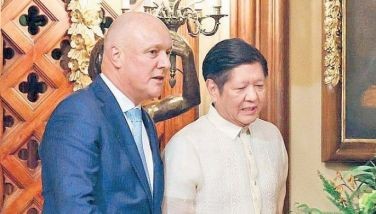Marcos dishonorably discharged as commander-in-chief, argues Justice Carpio
MANILA, Philippines — The late strongman Ferdinand Marcos as the commander-in-chief was dishonorably discharged by the people through a revolution in 1986, Supreme Court Senior Associate Justice Antonio Carpio argued on Wednesday.
In questioning lawyer Neri Colmenares, among the petitioners opposing the burial of Marcos at the Libingan ng mga Bayani, Carpio said Marcos as the head of state was also the highest military official and may have forfeited his entitlement to be buried at the Heroes' Cemetery, considered a national shrine.
"President Marcos was dishonorably separated from the people in 1986," Carpio said at the oral arguments' first session.
The magistrate said that public funds and properties, such as the cemetery, should only be used for public purposes and for the people's "general welfare."
"But if a person has been dishonorably discharged from service and you bury him there in a government property, that is for a private purpose, to extol honor for the family or the person, not for the public, there is no public good there," Carpio added.
The president can amend the directive, insofar as it does not amend a law or runs contrary to the Constitution.
"He can amend it, but as we argued, the standards in RA 289 will be incorporated in his new directed, in this case Marcos is still disqualified, your honor," Colmenares said.
Colmenares agreed with Carpio's arguments, saying President Rodrigo Duterte can amend or scrap existing circulars or memoranda in ordering Marcos' burial at the site, but he cannot violate "standards" under Republic Act 289 (RA 289) on the construction of national pantheons for Philippine presidents and patriots.
"The petitioners' contention (is) that RA 289 has a standard, the president's directive cannot amend RA 289 and must also be struck down, your honor," the former Bayan Muna party-list representative said.
RA 289 states that a national cemetery is to "perpetuate the memory" of Philippine presidents, patriots and heroes "for the inspiration and emulation of this generation and of generations still unborn."
Colmenares said Marcos' burial at the Heroes' Cemetery is not worthy of "inspiration and emulation" given the human rights abuses and plunder during his term.
Former Solicitor General Florin Hilbay, meanwhile, joined the online conversation on the ongoing arguments, saying Marcos does not fit the law's description.
"It's not whether Marcos is a hero. It's whether he isn't. 'Worthy of emulation' is a negative, checking standard. Law and cases show he isn't," Hilbay said on Twitter.
Duterte said Marcos can be granted final interment at the Heroes' Cemetery for being a former soldier or president regardless of human rights violations during the martial law period he oversaw.
Interment policy for the Libingan ng mga Bayani under the Armed Forces of the Philippines grants space for soldiers, presidents and other dignitaries. The same policy, however, prohibits interment of those who were "dishonorably separated or reverted or discharged from service" and on the grounds of moral turpitude. — Camille Diola; Audio report by Efigenio Toledo IV
- Latest
- Trending




























